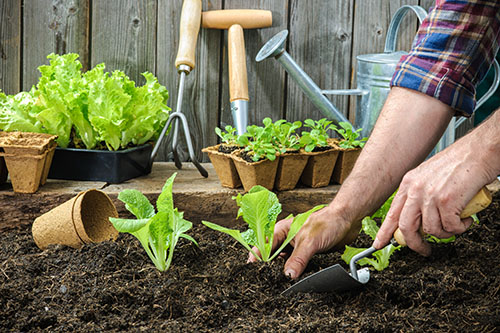Early Spring Planting
Mar 11, 2024

Spring is an exciting time for gardeners in Tennessee. As the weather warms up and the days grow longer, it’s the perfect opportunity to start planting vegetables in your garden. However, planting in early spring can be tricky, especially with the unpredictable weather patterns that we often experience in the Volunteer State.
To help you get started on the right foot, here are some tips and tricks for planting vegetables in the early spring.
Know your planting zone
Tennessee is divided into different USDA hardiness zones, ranging from zone 6b in the higher elevations of the Appalachian Mountains to zone 8a in the warmer regions of the state. Before you start planting, it’s important to know your specific planting zone as it will dictate which vegetables are likely to thrive in your area and when to plant them. To view the 2023 USDA Plant Hardiness Zone Map, click here.
Start seeds indoors
For many vegetables, starting seeds indoors is the key to getting a head start on the growing season. In Tennessee, you can start seeds indoors as early as late February or early March for warm season crops like tomatoes, peppers, and eggplants. Use seed trays or small pots filled with a seed starting mix as can be found at your local Co-op and keep them in a sunny window or under grow lights.
Harden off seedlings
Before transplanting seedlings outdoors, it’s crucial to harden them off to acclimate them to outdoor conditions. About a week before you plan to transplant them, gradually expose your seedlings to outdoor elements such as sunlight, wind, and fluctuating temperatures. Start with a few hours outdoors and gradually increase the time each day.
Choose hardy vegetables
In early spring, temperatures in Tennessee can still fluctuate, with occasional frosts and freezes. To mitigate the risk of losing your crops to frost, focus on planting cold-hardy vegetables that can tolerate cooler temperatures and that can be planted when the ground is still relatively hard. Some excellent options include lettuce, spinach, kale, broccoli, cauliflower, peas, carrots, and radishes.
Check your soil
Proper soil moisture is essential for the healthy growth of your vegetable plants. In early spring, the soil may still be cool and damp, so be mindful not to overwater your plants. Simply use your fingers to check the soil moisture level before watering, and water deeply but infrequently to encourage deep root growth. It is also recommended to test your soil to see what nutrients or organic materials it needs. Your local Co-op likely offers soil sampling services, so don’t hesitate to reach out.
While planting in early spring presents its share of challenges, following the tips listed above is a great way to set yourself up for a successful growing season. Your local Co-op is here to serve you with a variety of seed, high-quality supplies, and expert advice — so roll up your sleeves, dig into the soil, and start planting! Find the nearest location here.
For more content like this, check out the latest issue of The Cooperator.
To help you get started on the right foot, here are some tips and tricks for planting vegetables in the early spring.
Know your planting zone
Tennessee is divided into different USDA hardiness zones, ranging from zone 6b in the higher elevations of the Appalachian Mountains to zone 8a in the warmer regions of the state. Before you start planting, it’s important to know your specific planting zone as it will dictate which vegetables are likely to thrive in your area and when to plant them. To view the 2023 USDA Plant Hardiness Zone Map, click here.
Start seeds indoors
For many vegetables, starting seeds indoors is the key to getting a head start on the growing season. In Tennessee, you can start seeds indoors as early as late February or early March for warm season crops like tomatoes, peppers, and eggplants. Use seed trays or small pots filled with a seed starting mix as can be found at your local Co-op and keep them in a sunny window or under grow lights.
Harden off seedlings
Before transplanting seedlings outdoors, it’s crucial to harden them off to acclimate them to outdoor conditions. About a week before you plan to transplant them, gradually expose your seedlings to outdoor elements such as sunlight, wind, and fluctuating temperatures. Start with a few hours outdoors and gradually increase the time each day.
Choose hardy vegetables
In early spring, temperatures in Tennessee can still fluctuate, with occasional frosts and freezes. To mitigate the risk of losing your crops to frost, focus on planting cold-hardy vegetables that can tolerate cooler temperatures and that can be planted when the ground is still relatively hard. Some excellent options include lettuce, spinach, kale, broccoli, cauliflower, peas, carrots, and radishes.
Check your soil
Proper soil moisture is essential for the healthy growth of your vegetable plants. In early spring, the soil may still be cool and damp, so be mindful not to overwater your plants. Simply use your fingers to check the soil moisture level before watering, and water deeply but infrequently to encourage deep root growth. It is also recommended to test your soil to see what nutrients or organic materials it needs. Your local Co-op likely offers soil sampling services, so don’t hesitate to reach out.
While planting in early spring presents its share of challenges, following the tips listed above is a great way to set yourself up for a successful growing season. Your local Co-op is here to serve you with a variety of seed, high-quality supplies, and expert advice — so roll up your sleeves, dig into the soil, and start planting! Find the nearest location here.
For more content like this, check out the latest issue of The Cooperator.